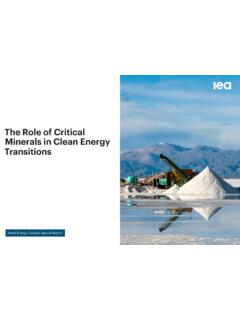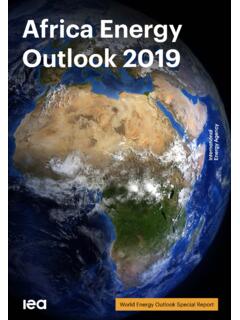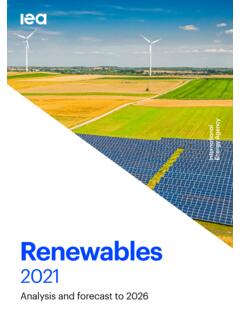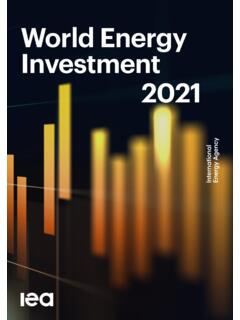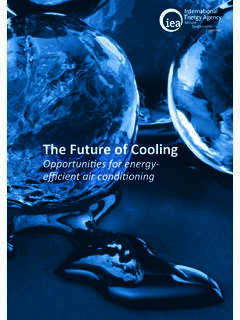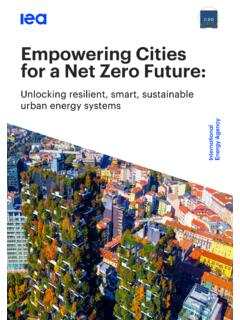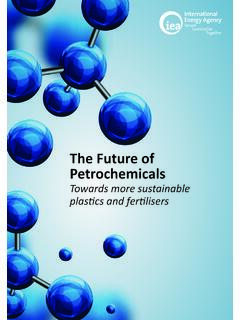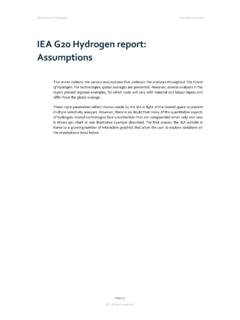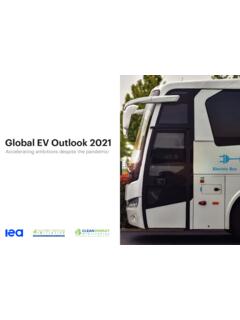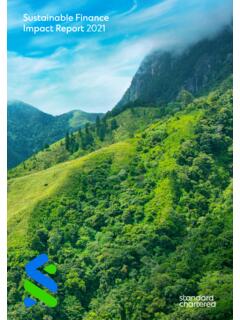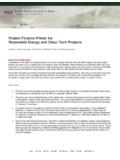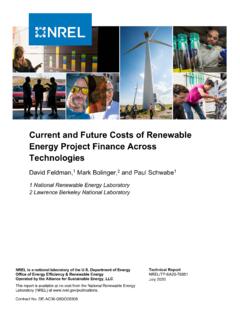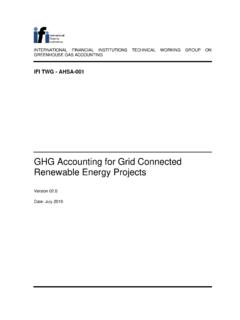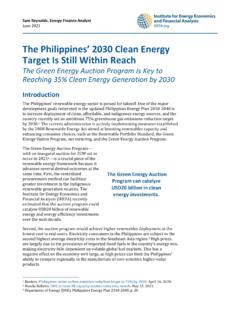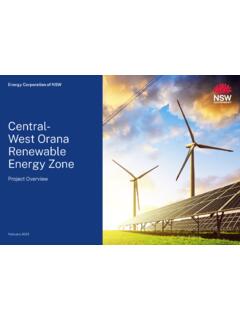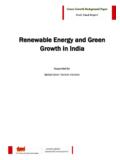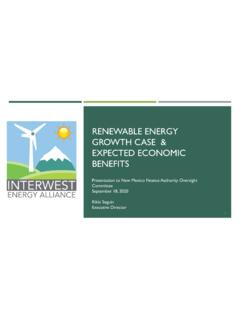Transcription of Financing Clean Energy Transitions in Emerging and …
1 Financing Clean Energy Transitions in Emerging and Developing Economies World Energy Investment 2021 Special Report in collaboration with the World Bank and the World Economic Forum INTERNATIONAL Energy . AGENCY. The IEA examines the IEA member IEA association full spectrum countries: countries: of Energy issues including oil, gas and Australia Brazil coal supply and Austria China demand, renewable Belgium India Energy technologies, Canada Indonesia electricity markets, Czech Republic Morocco Energy efficiency, Denmark Singapore access to Energy , Estonia South Africa demand side Finland Thailand management and France much more. Through Germany its work, the IEA Greece advocates policies Hungary that will enhance the Ireland reliability, affordability Italy and sustainability of Japan Energy in its Korea 30 member Luxembourg countries, Mexico 8 association Netherlands countries and New Zealand beyond. Norway Poland Portugal Slovak Republic Spain Sweden Please note that this publication is subject to Switzerland specific restrictions that limit Turkey its use and distribution.
2 The United Kingdom terms and conditions are available online at United States This publication and any The European map included herein are without prejudice to the Commission also status of or sovereignty over participates in the any territory, to the work of the IEA. delimitation of international frontiers and boundaries and to the name of any territory, city or area. Source: IEA. All rights reserved. International Energy Agency Website: Foreword The work of the International Energy Agency (IEA) has made it crystal clear that countries around the world must urgently accelerate their Transitions to Clean Energy . This is critical to stave off the worst effects of climate change and to build a more healthy, prosperous and secure future where everyone has access to Clean and affordable Energy supplies. Our recent landmark report, Net-Zero by 2050: A Roadmap for the Global Energy Sector, set out a narrow but achievable pathway towards such a future.
3 However, countries are not starting on the journey from the same place and the damaging effects of the Covid-19 crisis are lasting longer in many parts of the developing world: the economic slump is deeper, and the capacity to drive a sustainable recovery is limited. If Energy Transitions and Clean Energy investment do not quickly pick up speed in Emerging and developing economies, the world will face a major fault line in efforts to address climate change and reach other sustainable development goals. This is because the bulk of the growth in global emissions in the coming decades is set to come from Emerging and developing economies as they grow, industrialise and urbanise. There is a huge opportunity to take advantage of lower-cost Clean Energy technologies, led by solar and wind, to forge a new low-emissions development model for the developing world. There is also no shortage of capital globally to realise such a vision. However, this capital is not finding its way to the countries and sectors where it is most needed.
4 Many institutions are supporting Energy Transitions in developing countries, with good intentions and often impressive results. But private capital does not yet see the right balance of risk and reward in Clean Energy projects. Fostering the financial conditions for a rapid deployment of Clean Energy technologies in Emerging and developing economies is one of the defining challenges of our times. Every country must choose its own Energy path based on its specific needs and resources, and there is a lot that countries themselves can do to create and improve the conditions for Clean Energy investment. But the global challenge of climate change demands global solutions: the international community has to ensure that all countries have the support that they need to move forward in this critical endeavour. This why the IEA joined forces with the World Bank and the World Economic Forum to produce this special report, which draws on nearly 50 on-the-ground case studies across Clean power, efficiency and electrification, as well as Transitions for fuels and emissions- intensive sectors in countries ranging from Brazil to Indonesia, and from Senegal to Bangladesh.
5 This enables us to offer recommendations for priority actions to get the investment tap flowing to vast under-served areas of the world. These recommendations include measures to enhance financial markets, improve the visibility of public policies, remove distortions from Energy markets, enable grids to better integrate renewable power, empower local entrepreneurs to develop smaller-scale Clean Energy solutions, as in Energy efficiency, and build models for universal access to modern IEA. All rights reserved Energy . Foreword 3. These are tasks that the Energy sector cannot tackle alone. The massive scale of the challenge requires rethinking how we approach it and major efforts from international financial institutions, their donors, multilateral development banks and many other actors. Many institutions are already seeking to do more, which I welcome. But when we look at the numbers globally today, it is clear that we are nowhere near mobilising the level of funds that will be needed.
6 This is why one of the most urgent recommendations is that governments give international public finance institutions a strong strategic mandate to finance Clean Energy Transitions in the developing world. Accelerating Clean Energy Transitions in Emerging and developing economies can no longer be just one investment option among many. It has to become a major priority for governments and investors worldwide. Our planet's future depends on meeting this challenge and avoiding deep fractures in global efforts to tackle climate change. The IEA is ready to play a leading role in bringing countries together to share resources and expertise in tackling key sources of emissions. Our Clean Energy Transitions Programme which leverages the IEA's unique Energy expertise across all fuels and technologies to accelerate global Clean Energy Transitions , particularly in major Emerging economies and other key initiatives across Asia, Africa and the Americas demonstrate our commitment and capacity to help build a sustainable future for all.
7 I hope this special report will move the conversation forward and lead to concrete actions to enable a far greater number of Clean Energy projects to flourish worldwide. This work will also be a guiding light for the IEA's own work on investment and finance , where we will continue to provide the data, insights and advice for policy makers and practitioners. I would like to address special thanks to the entire team that produced this crucial report under the outstanding leadership of my colleagues Tim Gould and Michael Waldron. Dr Fatih Birol Executive Director International Energy Agency 4 Financing Clean Energy Transitions in EMDEs | Special Report Acknowledgements This report was prepared by the Energy Investment Unit in the Energy Supply and Investment Outlook (ESIO) Division of the Directorate of Sustainability, Technology and Outlooks (STO). Michael Waldron co-ordinated the project and was the lead author; he designed and directed the report with Tim Gould, Head of Division for Energy Supply and Investment Outlooks.
8 The team of principal authors and co-ordinators consisted of Lucila Arboleya Sarazola (led Clean electricity; co-ordinated Chapter 3); Peter Zeniewski (led fuel supply; co-ordinated Chapter 4); Blandine Barreau (led financial systems); Tanguy de Bienassis (led buildings/end- use); Pablo Gonzalez (co-ordinated sources of finance modelling; Clean electricity); Inchan Hwang (led transport; co-ordinated sources of finance data); Laura Maiolo (producer economies, industry). Ryszard Pospiech co-ordinated modelling and data across sectors. Key contributions were made by Adam Baylin-Stern (CCUS), Arnaud Rouget (access), Jihyun Selena Lee (efficiency), Amelia Brinkerhoff (policies, financial indicators) and Hugh Miller (financial system/indicators). The report draws upon IEA modelling and analytical efforts by the World Energy Outlook team and the Energy Technology Perspectives team. Eleni Tsoukala and Marie Fournier-S'Niehotta provided essential support.
9 The report benefited greatly from other contributions from experts within the IEA: Yasmine Arsalane, St phanie Bouckaert, Davide D'Ambrosio, Chiara Delmastro, Carlos Fernandez Alvarez, Yuanyuan Gong, Zoe Hungerford, Tae-Yoon Kim, Jinyoung Kim, Kevin Lane, Lilly Yejin Lee, Christophe McGlade, Lia Newman, Sebastian Papapanagiotou, Apostolos Petropoulos, Jasmine Samantar, Martin Tav, Gianluca Tonolo and Brent Wanner. Erin Crum was the copy- editor. Mechthild W rsd rfer (Director for STO), Laszlo Varro (Chief Economist) and Alessandro Blasi provided support and guidance throughout the project. Valuable comments and feedback were provided by senior management and numerous other colleagues within the IEA, in particular Keisuke Sadamori, Laura Cozzi, Katherine Dixon, Paolo Frankl, Peter Fraser, Rebecca Gaghen, Timur Guel, Tom Howes, Brian Motherway, Ali Al-Saffar, Cyril Cassisa, Kieran Clarke, Alejandro Hernandez, Joerg Husar, Maximilian Jarrett, Randi Kristiansen, Nathaniel Lewis-George, Jinsun Lim, Luca Lo Re, Rebecca McKimm, Ana Rovzar, Alan Searl and Nicole Thomas.
10 Thanks also to Jad Mouawad, Head of the Communications and Digital Office (CDO), and to CDO colleagues Tanya Dyhin, Merve Erdil, Grace Gordon, Jethro Mullen, Rob Stone, Jon Custer, Christopher Gully, Julie Puech, Mariam Aliabadi, Astrid Dumond, Isabelle Nonain- Semelin, Clara Vallois, Gregory Viscusi and Therese Walsh. Graham Weale provided valuable expert feedback and editorial advice. IEA. All rights reserved Acknowledgements 5. A High-Level Advisory Group provided strategic guidance for this project. Its members are: Amani Abou-Zeid Commissioner for Infrastructure and Energy , African Union Commission Alfonso Blanco Executive Secretary, Latin American Energy Organization (OLADE). Roberto Bocca Head of Energy , Materials and Infrastructure, World Economic Forum Jason Bordoff Founding Director of the Center on Global Energy Policy, Columbia University SIPA. Deirdre Cooper Portfolio Manager and co-head of Thematic Equities, Ninety One Charles Donovan Executive Director, Centre for Climate finance , Imperial College Business School Nandita Parshad Managing Director, Sustainable Infrastructure, European Bank for Reconstruction and Development Demetrios Papathanasiou Global Director for Energy and Extractives, World Bank Ken Rogoff Thomas D.

